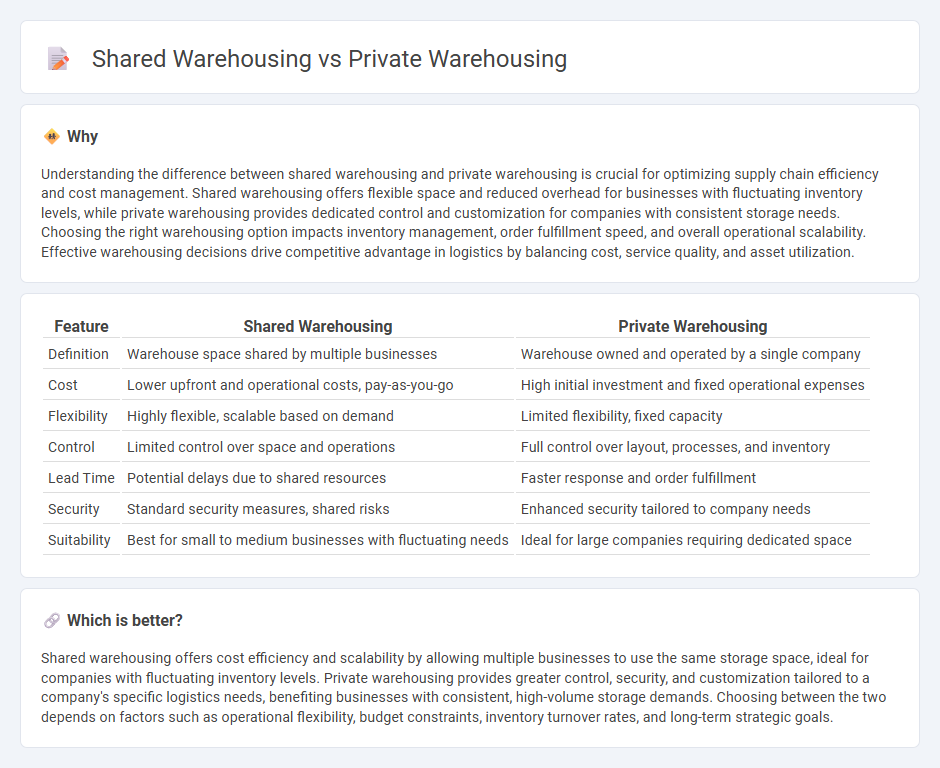
Shared warehousing offers cost-efficiency and flexibility by allowing multiple businesses to use the same storage space, optimizing inventory management and reducing overhead. Private warehousing provides greater control, customization, and security, ideal for companies with unique storage needs or high volumes of goods. Explore the benefits and challenges of each to determine the best logistics strategy for your business.
Why it is important
Understanding the difference between shared warehousing and private warehousing is crucial for optimizing supply chain efficiency and cost management. Shared warehousing offers flexible space and reduced overhead for businesses with fluctuating inventory levels, while private warehousing provides dedicated control and customization for companies with consistent storage needs. Choosing the right warehousing option impacts inventory management, order fulfillment speed, and overall operational scalability. Effective warehousing decisions drive competitive advantage in logistics by balancing cost, service quality, and asset utilization.
Comparison Table
| Feature | Shared Warehousing | Private Warehousing |
|---|---|---|
| Definition | Warehouse space shared by multiple businesses | Warehouse owned and operated by a single company |
| Cost | Lower upfront and operational costs, pay-as-you-go | High initial investment and fixed operational expenses |
| Flexibility | Highly flexible, scalable based on demand | Limited flexibility, fixed capacity |
| Control | Limited control over space and operations | Full control over layout, processes, and inventory |
| Lead Time | Potential delays due to shared resources | Faster response and order fulfillment |
| Security | Standard security measures, shared risks | Enhanced security tailored to company needs |
| Suitability | Best for small to medium businesses with fluctuating needs | Ideal for large companies requiring dedicated space |
Which is better?
Shared warehousing offers cost efficiency and scalability by allowing multiple businesses to use the same storage space, ideal for companies with fluctuating inventory levels. Private warehousing provides greater control, security, and customization tailored to a company's specific logistics needs, benefiting businesses with consistent, high-volume storage demands. Choosing between the two depends on factors such as operational flexibility, budget constraints, inventory turnover rates, and long-term strategic goals.
Connection
Shared warehousing and private warehousing are connected through their roles in supply chain efficiency and inventory management, providing businesses with flexible storage solutions tailored to varying operational needs. Shared warehousing offers cost-effective, scalable space for multiple clients, while private warehousing provides exclusive control and customized logistics for a specific company. Both models integrate advanced technology and real-time data tracking to optimize distribution, reduce lead times, and enhance overall logistics performance.
Key Terms
Ownership
Private warehousing involves exclusive ownership and control of storage facilities by a single company, providing tailored inventory management and security. Shared warehousing offers multiple businesses access to common storage spaces, optimizing cost efficiency and flexibility without the burden of property maintenance. Discover the advantages and suitable applications of each warehousing model to enhance your supply chain strategy.
Cost Structure
Private warehousing involves significant upfront capital investment and fixed operational costs, making it more cost-effective for businesses with high storage volumes and long-term needs. Shared warehousing offers variable costs based on usage, reducing financial risk for companies with fluctuating inventory levels or seasonal demand. Explore detailed cost comparisons and tailored solutions to find the best warehousing strategy for your business.
Flexibility
Private warehousing offers unmatched flexibility by allowing businesses to customize storage solutions, control inventory management, and adjust operations according to specific needs without external constraints. Shared warehousing provides scalable flexibility, enabling companies to rent space on demand and share resources, reducing costs while adapting quickly to fluctuating inventory volumes. Explore more to understand which warehousing model best supports your operational flexibility and growth strategy.
Source and External Links
Exploring the Impact of Private Warehousing on Business Logistics - Private warehousing involves a facility owned or leased by a single company, offering full control over operations, enhanced security, optimized supply chain storage, and long-term cost savings as key benefits.
Private, Public, or Contract: Which Warehousing Type is Right for You? - Private warehousing allows businesses to own and manage their storage and logistics independently with flexibility to customize operations, though it carries operational responsibility and requires cost-benefit analysis.
Private Warehouse: Benefits, Challenges, and Who Should Use Them - A private warehouse is owned and operated by a business for exclusive use, providing control over inventory management, security, customized layout, and potential for branding advantages.
 dowidth.com
dowidth.com